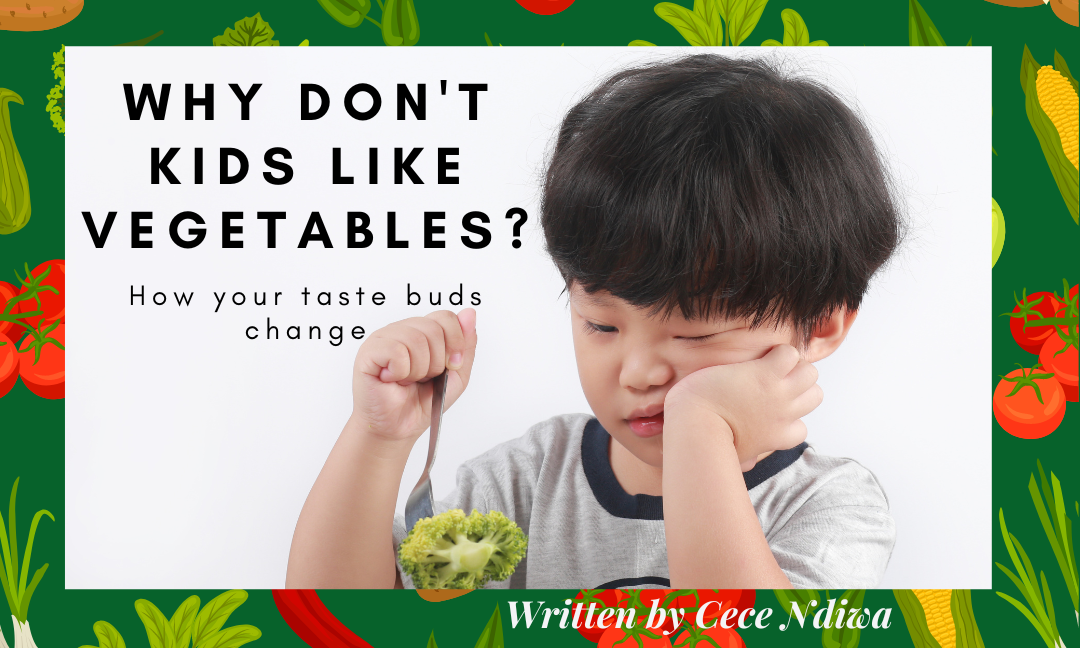Why do Kids Dislike Vegetables? How Aging Affects Taste Buds
Written By: Cece Ndiwa
Edited By: Advita G.
Designed By: Cece Ndiwa
Published By: Miriam Alonge Wato

It’s commonly seen as a fact that kids and toddlers love sweets but dislike vegetables. This stereotype is seen everywhere in movies and television and if you ask any parent, they would adamantly tell you about the struggle it is to get children to eat vegetables. Although some people believe that it could be just chalked up to the kids themselves, there are some studies that show that children are biologically wired to dislike vegetables. Remarkably enough, many people that grew up stubbornly avoiding vegetables say that they simply outgrew their hatred for vegetables. All this raises the question: how does your sense of taste change as you age?
Childhood and bitter foods
As to answer why kids dislike eating vegetables, scientists have concluded that the human brain has evolved to dislike bitter food as they signify toxic and poisonous food. Because vegetables have a large component of calcium and other beneficial constituents such as phenols and flavonoids, falling into the category of bitter foods, this leads to children preferring saltier and sweet foods. When these children grow up eating vegetables, they build a higher tolerance to the bitterness of vegetables, which explains why most adults start to embrace their taste (while a younger version of them may have avoided them).
Additionally, sweeter and unhealthy foods are typically associated with happier memories. Many parents treat eating out and getting candies after behaving well typically leading children to associate these foods as rewards. This means that kids may not necessarily dislike vegetables but they may dislike the memories like their parents nagging them that they associate with vegetables
Aging and taste buds

Previously it was mentioned that many adults overcome their distaste towards vegetables through repeated exposure. However, another factor responsible for this would be that you taste buds change as you get older. Humans are typically born with around 10,000 taste buds only decreasing from ages 40 to 50. This means that it gets harder to distinguish sweet, salty and bitter foods.
Another thing to note, while some people may have enjoyed scarfing down copious amounts of sweets while they were young, some of them note that eating those same sweets just doesn’t taste the same. For many adults and older people, the taste of sugar and candy is far too overwhelming because children have evolved to prefer foods with more calories such as sugary foods.
What can you do to help children eat vegetables?
You won’t be-leaf this (pun-intended!) but here are a couple of things parents can do to get their kids to eat vegetables!
- Disguise it!
Arguably the most effective trick in the book, hiding vegetables in food they already enjoy may be a great trick to get your kids to eat vegetables. A commonly used trick is to blend vegetables like carrots and zucchini in muffins, bread and other dishes.
- Make it into a game!
Kids love games so making the process of eating vegetables more fun can help children associate them with more positive memories making them more likely to enjoy eating them.
- Eat them more often!
Most people when they recall their first time eating food like coffee and dark chocolate say that they had to eat it multiple before they could actually enjoy it. Therefore the more children attempt to eat veggies, the more likely they are to get used to their taste.
How to make food more flavorful?
For those who are struggling with losing taste buds here are some tips to bring back some flavour in your dishes!
- Use more herbs and spices
Because your taste buds decrease, the food you eat may no longer taste how it used to. A way to bring back flavour into foods is to simply add more spices and herbs into your foods to make them stand out more
- Eat meals with friends and family
Similarly to creating games to encourage kids to build a more association with vegetables, a tactic to make eating more enjoyable may be to surround yourself with loved ones during meals. For many people, the process of losing their sense of taste can be very disheartening. Therefore eating meals with friends, family and other loved ones can enhance meals by virtue of the positive rein
Conclusion
To summarize, it turns out that the stereotype of kids disliking vegetables is not only proven to be true but is not even their fault. In fact, it is biologically proven that as we get older, our taste buds evolve even decreasing in number at 40 years old. Though this process is inevitable and unpreventable, it is incredible how the human body changes!
________________________
References
“Aging Gracefully: Changes in the Taste Buds and Sense of Smell.” n.d. Comfort Keepers. Accessed December 4, 2022. https://www.comfortkeepers.com/articles/info-center/seniors-and-nutrition/aging-gracefully-changes-in-the-taste-buds-and-sense-of-smell.
Butler, Chris. 2022. “Science Explains Why Some Kids Hate Vegetables and How to Fix It.” Power of Positivity. https://www.powerofpositivity.com/vegetables-why-kids-hate/.
Orenstein, Beth W., and Lindsey Marcellin. 2014. “When Aging Steals Your Sense of Taste – Senior Health Center.” Everyday Health. https://www.everydayhealth.com/senior-health/when-aging-steals-your-sense-of-taste.aspx.
“The Scientific Reason Why You Hated Vegetables as a Kid.” 2016. Spoon University. https://spoonuniversity.com/lifestyle/the-scientific-reason-why-you-hated-vegetables-as-a-kid.
“Why do all kids hate vegetables? – Boxgreen.” 2020. Boxgreen. https://www.boxgreen.co/blogs/the-pantry/why-do-all-kids-hate-vegetables.

